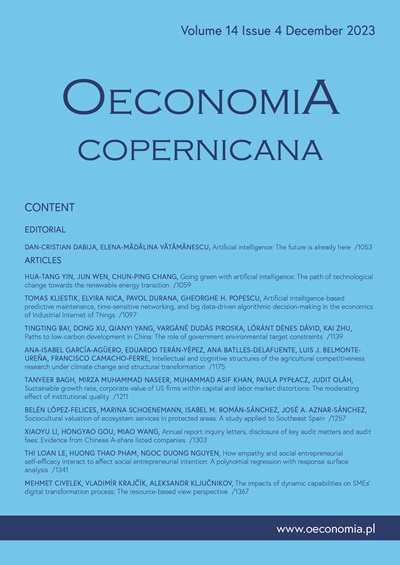从资源和经济角度评估欧洲国家的能源安全
IF 10.8
1区 经济学
Q1 ECONOMICS
引用次数: 6
摘要
研究背景:近年来,作为国民经济发展的关键部门,能源开发的经济环境状况受到了文献的广泛关注。个别能源的供应问题和有关的能源安全问题正在退居次要地位,最常见的原因是经济的强烈全球化和有关货物和服务在国际上自由流动的假设,因此在国际商品市场和能源交换上实际上有无限的购买可能性。然而,在危机局势中,能源安全的重要性显著增加。本文的目的:考虑到上述情况,本文的主要目的是在资源和经济条件的背景下评估欧洲国家的能源安全。方法:本文在分析32个欧洲国家的能源结构和各自内部能源的可用性的基础上,提出了自己的能源安全评估方法。在根据资源和经济决定因素(人均国内生产总值)将所研究的经济体分类为同质组的过程中,使用了主成分分析。研究结果与附加价值:本文的理论和方法附加价值来自于作者使用个体和总体能源充足指数评估能源安全的方法的发展。实证附加值与欧洲国家能源安全评估结果相关,可用于制定能源政策。因此,在评估的32个欧洲国家中,大多数国家的能源安全水平较低,这是由于在其能源组合中主要使用不可再生能源。能源安全水平较高的国家拥有自己的不可再生资源或使用可再生能源、水电或核能等替代能源载体。本文章由计算机程序翻译,如有差异,请以英文原文为准。
Assessing the energy security of European countries in the resource and economic context
Research background: In recent years, much attention in the literature has been paid to the economic and environmental conditions of energy development as a key sector for the development of national economies. The issue of availability of individual energy resources and related energy security is receding into the background, most often due to the strong globalization of economies and the associated assumption of free international flow of goods and services, and thus practically unlimited possibilities of buying on the international commodity markets and energy exchanges. Nevertheless, the importance of energy security increases significantly in crisis situations.
Purpose of the article: Bearing in mind the circumstances indicated above, the main objective of this article is to assess the energy security of European countries carried out in the context of resource and economic conditions.
Methods: The article proposes its own methodological approach to the assessment of energy security based on the analysis of the energy mixes of 32 European countries and the availability of their own internal energy sources. In the process of classifying the studied economies into homogeneous groups in terms of resource and economic determinants (GDP per capita), principal component analysis was used.
Findings & value added: The theoretical and methodological added value of the article results from the development of the author's approach to the assessment of energy security using individual and aggregated energy sufficiency index. Empirical added value is related to the results of energy security assessment in European countries, which can be used in shaping energy policies. Therefore, most of the 32 European countries assessed have a low level of energy security, which is due to the dominant use of non-renewable energy resources in their energy mixes. Countries with a high level of energy security have their own non-renewable resources or use alternative energy carriers in the form of renewable sources, hydropower or nuclear energy.
求助全文
通过发布文献求助,成功后即可免费获取论文全文。
去求助
来源期刊

Oeconomia Copernicana
ECONOMICS-
CiteScore
13.70
自引率
5.90%
发文量
26
审稿时长
24 weeks
期刊介绍:
The Oeconomia Copernicana is an academic quarterly journal aimed at academicians, economic policymakers, and students studying finance, accounting, management, and economics. It publishes academic articles on contemporary issues in economics, finance, banking, accounting, and management from various research perspectives. The journal's mission is to publish advanced theoretical and empirical research that contributes to the development of these disciplines and has practical relevance. The journal encourages the use of various research methods, including falsification of conventional understanding, theory building through inductive or qualitative research, first empirical testing of theories, meta-analysis with theoretical implications, constructive replication, and a combination of qualitative, quantitative, field, laboratory, and meta-analytic approaches. While the journal prioritizes comprehensive manuscripts that include methodological-based theoretical and empirical research with implications for policymaking, it also welcomes submissions focused solely on theory or methodology.
 求助内容:
求助内容: 应助结果提醒方式:
应助结果提醒方式:


